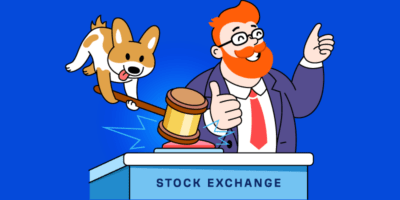Some SEO benefits of going public are obvious and instantly rewarding; others need a proactive approach to get the most out of the opportunity.
For this article, I analyzed many SEO angles of 11 companies across different countries and industries that went public in 2021 via initial public offering (IPO) or direct listing. And I found it boils down to these four main SEO benefits:
- Great links and brand mentions
- More sources to establish notability on Wikipedia
- More information and sources for Knowledge Graph entities
- Increased demand in branded searches
We’ll start with the most obvious SEO benefit that also largely impacts the other ones.
Going public is one of the rare occasions when even a relatively unknown company will get great media coverage. Basically, any media that reports about companies on the stock market is at play here.
The direct SEO benefits of this coverage can be divided into three segments: backlinks to the customer-facing website, backlinks to investor relations pages, and brand mentions. Let’s dive into each of them.
Links to customer-facing website
The first category is the backlinks to the homepage, product pages, FAQ, and other standard pages that potential customers of the business visit. In other words, these are simply the backlinks you’ll be happy to attract at any time.
All the companies I analyzed scored great links from highly authoritative media. I thought that they would often have the nofollow link attribute, but a lot of them didn’t—allowing link equity to be passed to the target URL.
And yes, even companies that aren’t well known globally can get great links. Coupang, the so-called Korean Amazon, got backlinks like these regarding its IPO in the U.S.:
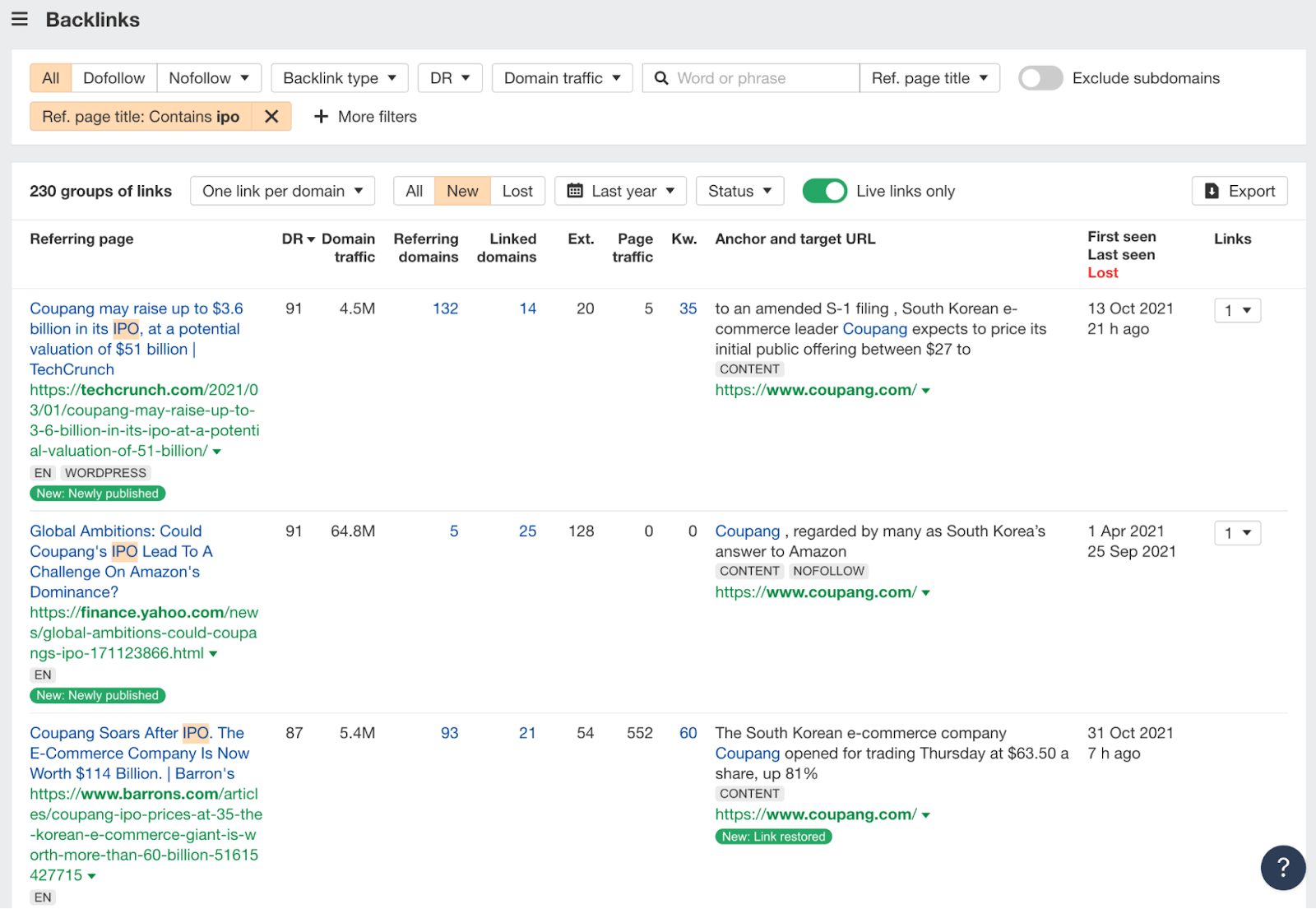
Screenshot from Backlinks report in Ahrefs’ Site Explorer.
You can see that all of those links are pointing to Coupang’s homepage, and only the middle one has a nofollow attribute. And that’s just for the IPO, which is the beginning of any stock-related coverage.
Links to investor relations pages
Media covering stock exchange news often naturally links to investor relations (IR) pages.
Here’s an example of the highest-authority backlinks (based on Domain Rating scores) pointing to Allbirds pages, all of them being on the IR subdomain:
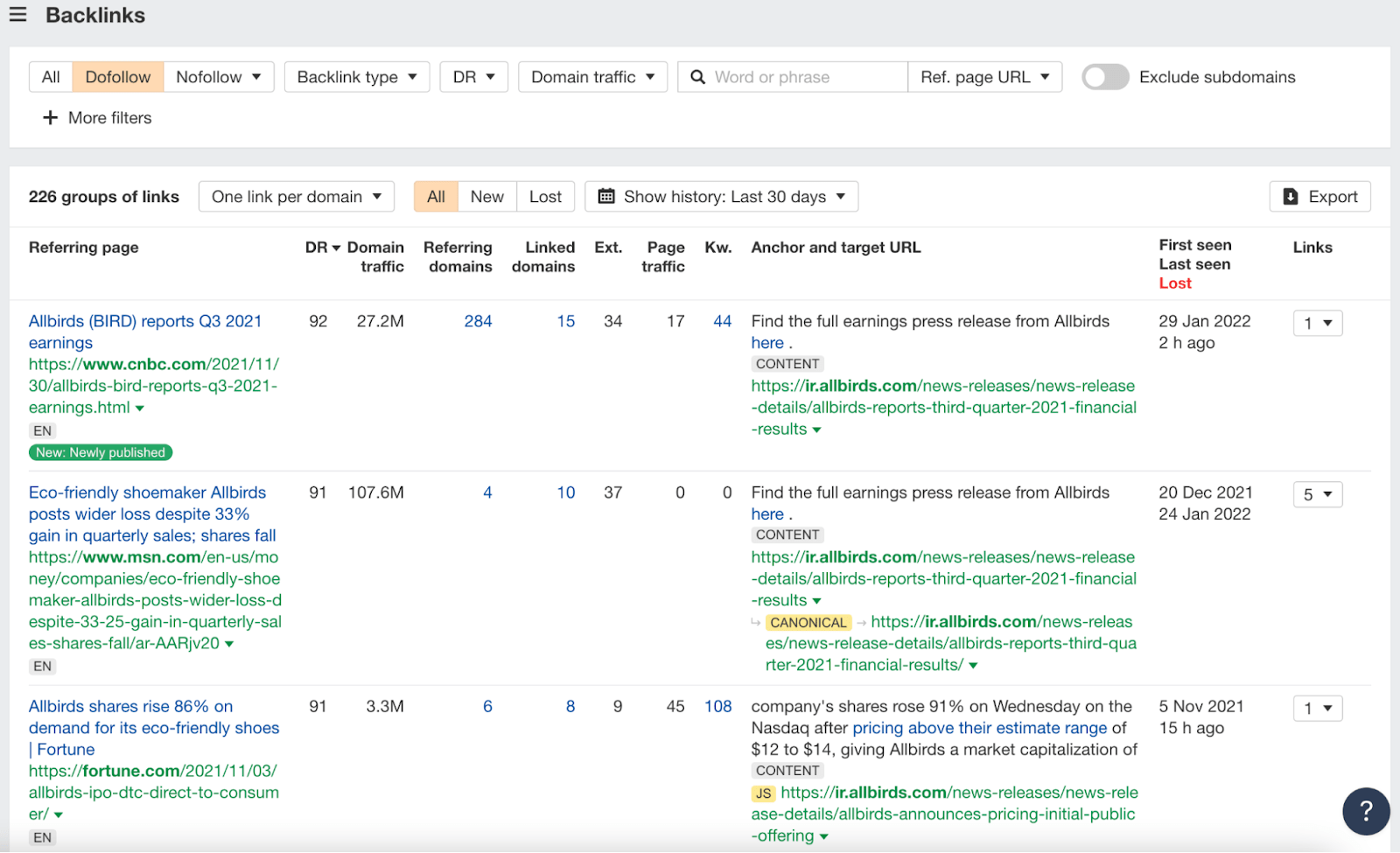
Public companies can easily accumulate some impressive backlinks to their IR pages this way.
The question is what potential these links may have with regards to rankings of other pages. There are two aspects we need to take into account here:
- IR content needs to be compliant with guidelines of the oversight regulatory authority (such as SEC in the U.S.). This isn’t the best place to get super creative and leverage the potential link bait by shoehorning unnecessary internal links.
- The context of these links is often just about the stock and financial aspects, which decrease its relevance to pages the company wants to boost in organic search.
These backlinks are still great, but I consider them less important than backlinks pointing to the standard pages. Many websites publishing content about stock markets will link to both IR and non-IR pages eventually.
Think of all the quarterly reports, mergers and acquisitions, and stock prices surging and plummeting. The media coverage doesn’t stop once a company goes public.
To illustrate, here’s Seeking Alpha, one of the most popular websites focused on investment-related content, linking to Oatly 36 times already. There are links to both IR and standard pages:
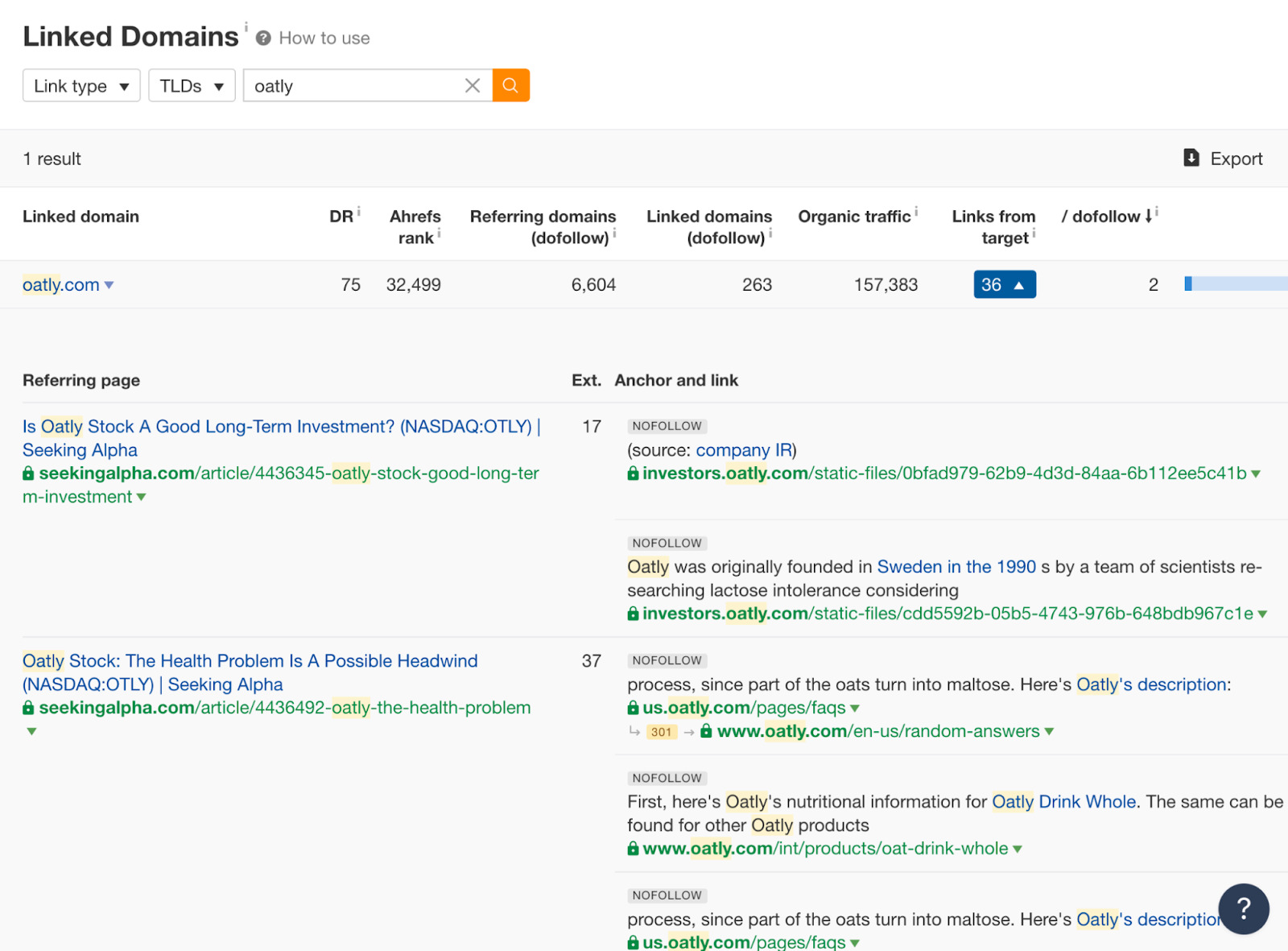
Screenshot taken from Linked Domains report in Ahrefs’ Site Explorer.
Brand mentions
More often than not, a piece of content mentioning your brand won’t link to you. But the unlinked brand mention counts for SEO too:
- It’s an opportunity to reach out and turn it into a link.
- It helps Google join the dots between the brand, i.e., entity in SEO terms, and what it does (we’ll dive into this later).
- It may improve the brand’s and website’s E-A-T (expertise, authoritativeness, and trustworthiness) as highly authoritative sources write about the business and products.
The rise in brand mentions is often quite significant. Here’s what the peak looks like for NerdWallet, which went public in November 2021 and was already on a solid upward trajectory of brand mentions:
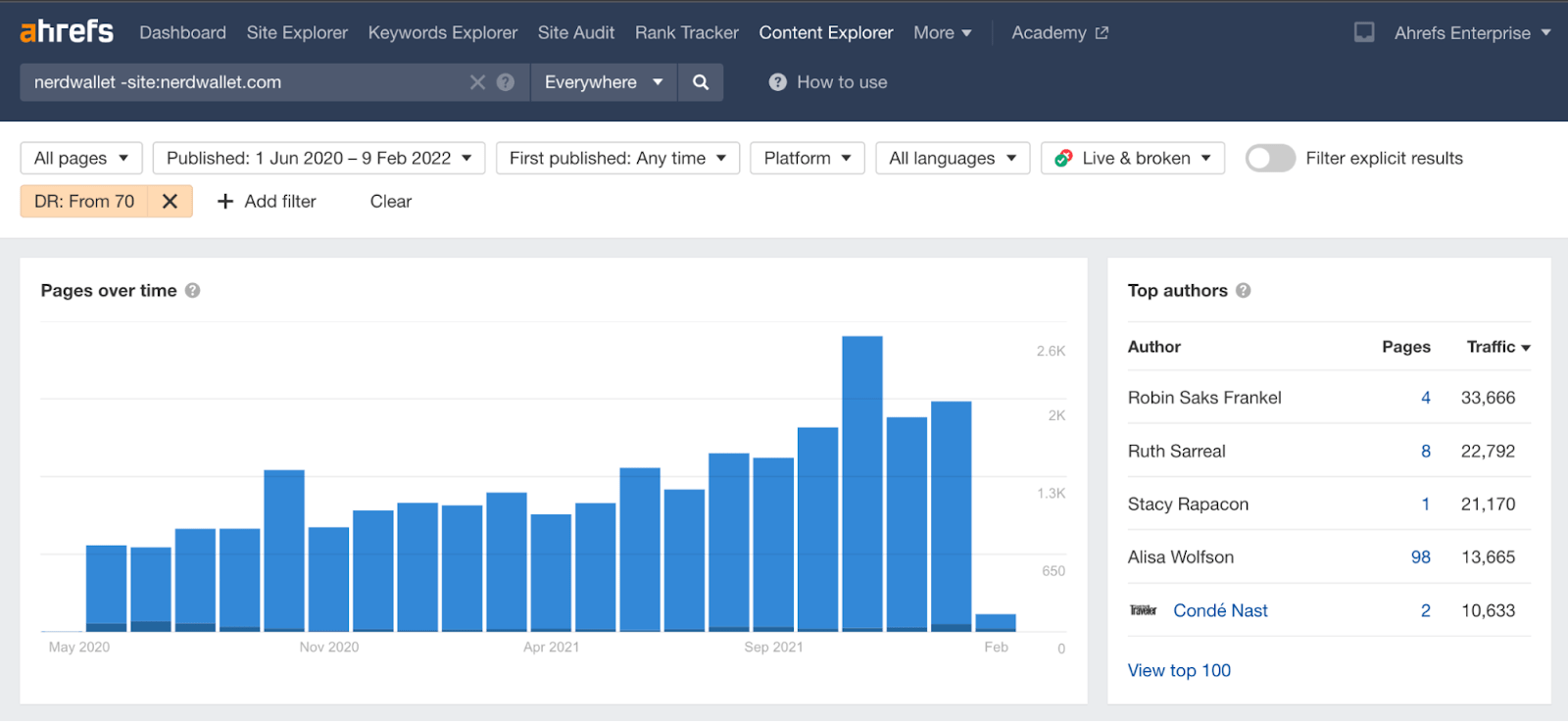
You may have noticed the DR >70 filter in this snippet from Ahrefs’ Content Explorer. That’s a quick filter to show only brand mentions from domains with a rather high domain authority to filter out most of the spam that all websites get.
Getting a Wikipedia page can be a nice shortcut to establish and reinforce an organization’s Knowledge Graph entities. That’s because Wikipedia is an often-used source of information for Google that can be visible to searchers in Knowledge Panels like this:
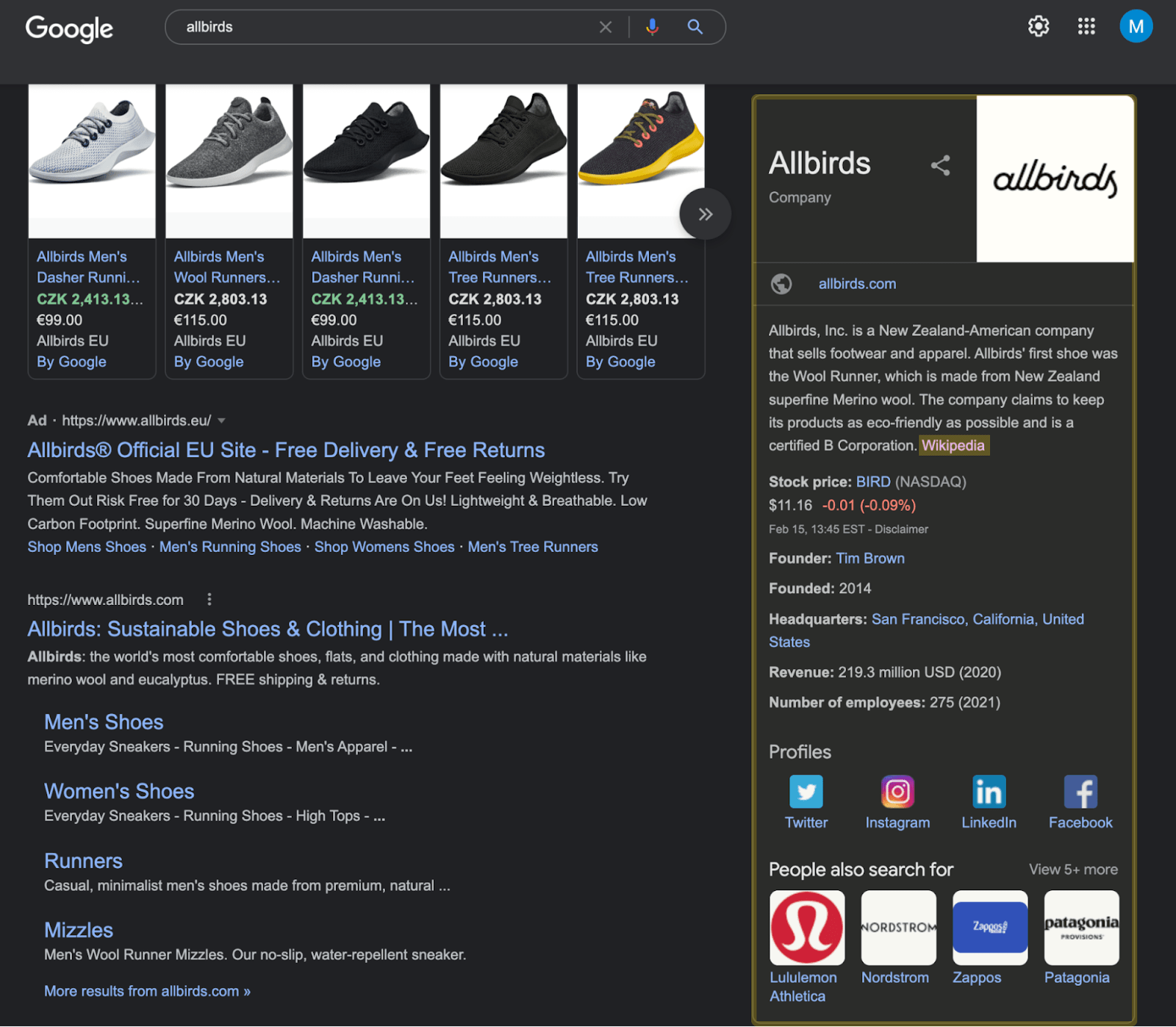
However, if you’re not lucky enough to have fans who chose to create your Wiki page without your incentive, you’re in for a tricky process of getting your Wiki profile approved.
The key to this is being notable enough to pass the criteria of Wiki editors. And the criteria largely revolve around significant coverage in reliable, independent secondary sources.
Yes, those are exactly the sources that report about companies going public. Here’s an example of such references on Oatly’s Wiki page:
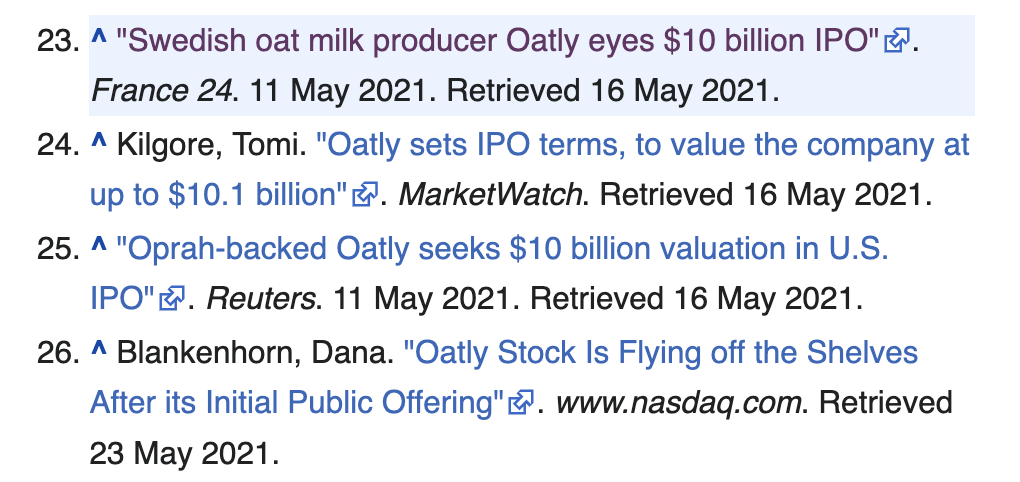
It’s fair to say that many companies going public already have Wiki pages that will stand the test of notability disputes. Going public is just another notable event that should be mentioned there, along with some changes to the company’s Wiki box:
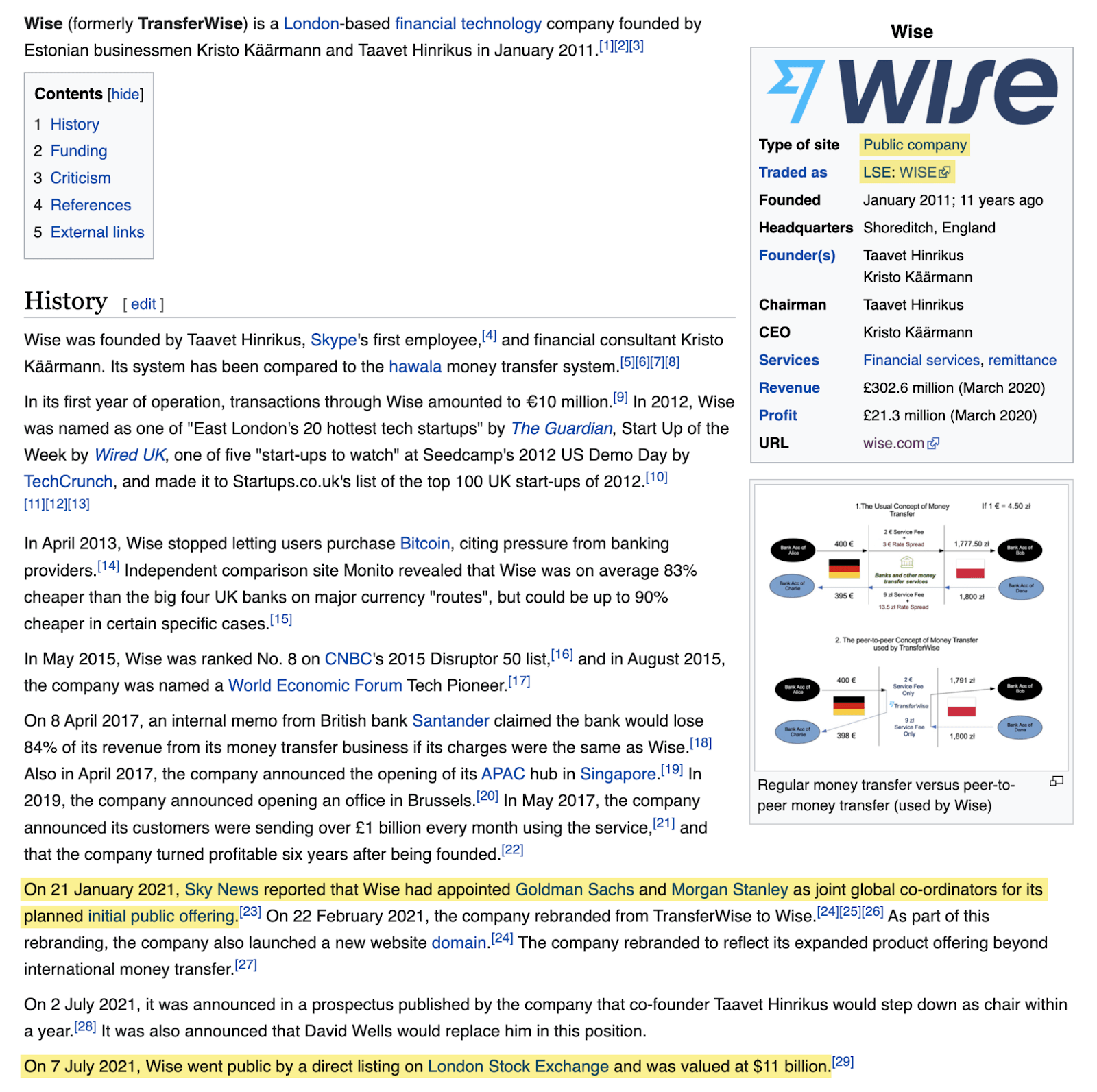
This is an example of additional information about a direct listing that only enriches an already well-covered and well-referenced Wiki page.
I saw a few Wiki pages of recently listed public companies that largely rely on the notability gained from the media coverage of the IPO or direct listing.
But it won’t be fair to show such examples because notability is a subjective matter, and I don’t want to cause any potential notability disputes or even Wiki page removals.
Recommended reading: How to Create a Wikipedia Page (Step by Step)
Wikipedia aside, there’s a direct influence on a company’s entity in the Knowledge Graph (KG) from the media coverage. I initially planned to write about reinforcing the KG entity as a benefit right away. But this point turned out to be more complicated and nuanced than that. Bear with me.
A lot of articles and news regarding the stock explain what the company does in plain English, such as this intro of a TechCrunch article:

Seeing such easy-to-understand information in highly authoritative sources can be a goldmine for Google to update its data about the entity in its Knowledge Graph. I thought this would easily increase Google’s certainty about the entity, which is great for SEO and branding (given it’s fed the correct information).
Most SEOs would probably agree with me here. We could call it a day and move on to another point. But even though it’s a bit tricky, there’s a way to (dis)prove the thesis.
So the nerdy fun begins.
If you call Google’s Knowledge Graph API, it will return an entity, or entities, related to your query with a score reflecting how confident Google is in the relevance. But it doesn’t provide historical data.
Luckily, there’s a tool with a historical database of these scores for many entities: Kalicube Pro SaaS platform run by Jason Barnard, who’s a well-known expert in the field of brand SERPs and entity SEO.
Jason was kind enough to dig into the data and help me make sense of it all, as the results were rather surprising. There was no clear pattern. We even encountered some KG confidence score drops around the period of entering the stock market, as in this case of DigitalOcean:
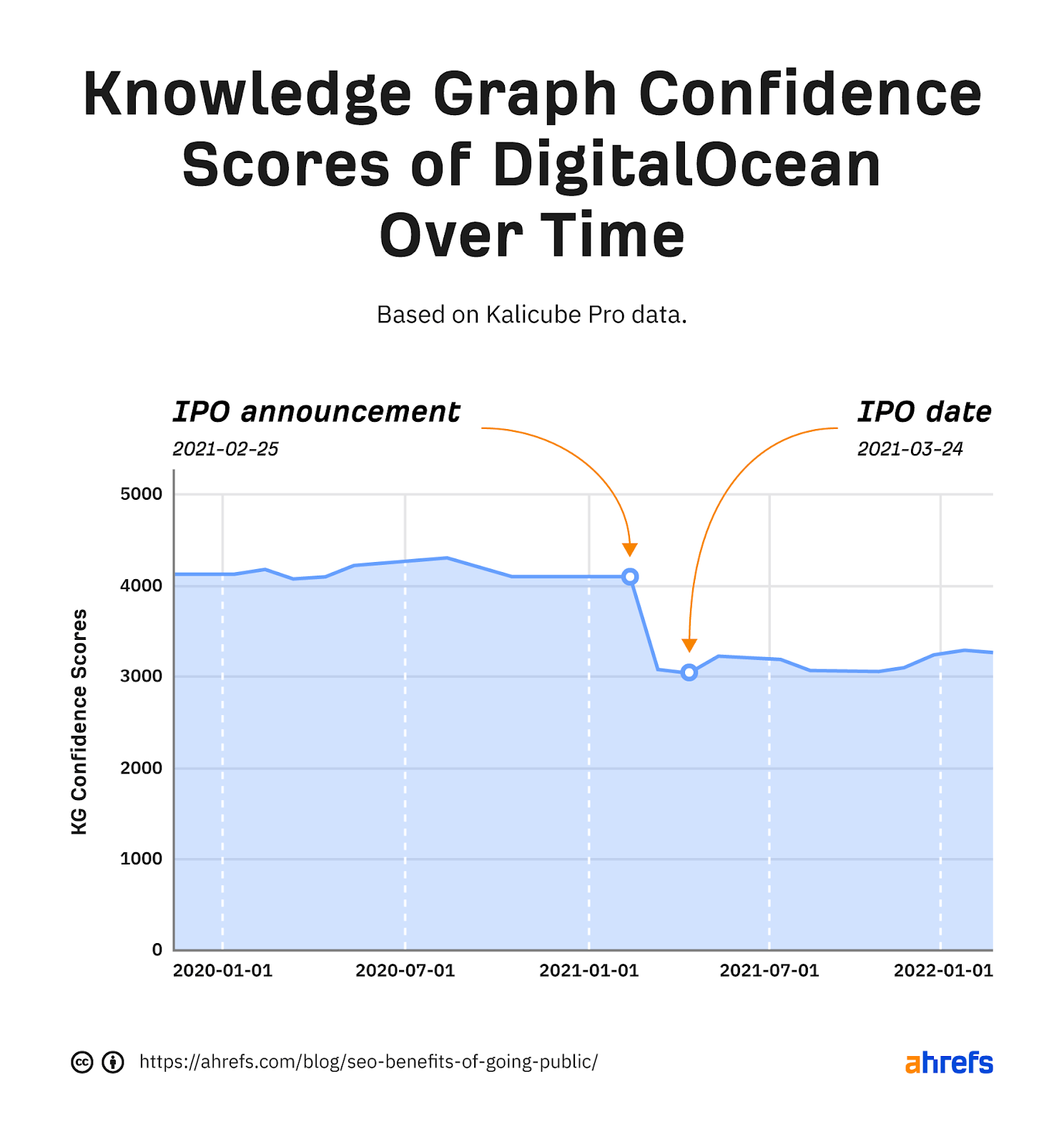
In contrast, there’s also this case of Coinbase, which saw a surge in its KG confidence scores, after it announced going public and after the direct listing:
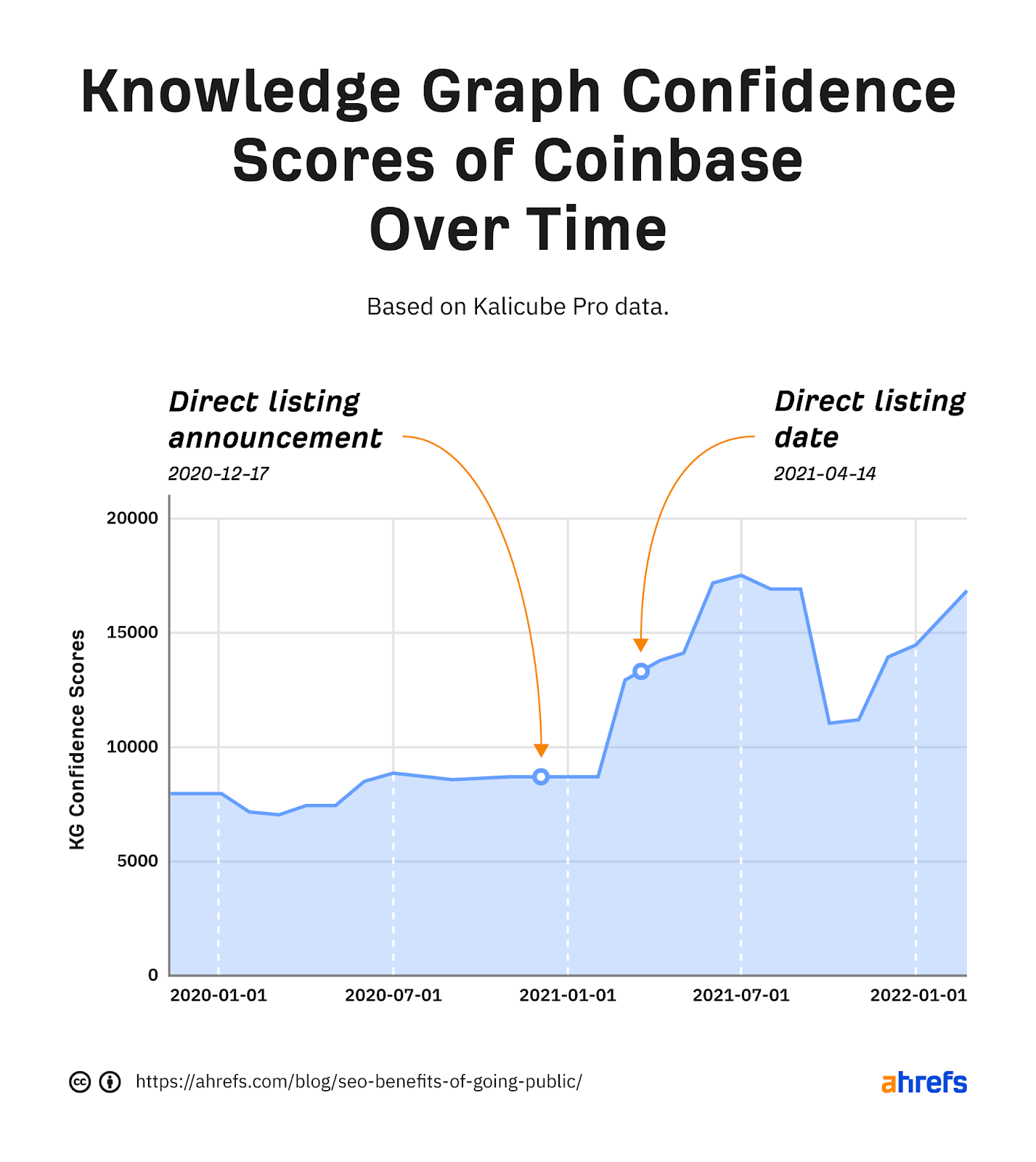
What do we make of it? There’s an opportunity to leverage media coverage for reinforcing the KG entity, but SEO and PR teams need to be actively involved in the process. So what’s the catch?
As companies enter the stock market, they change their business and legal entities from private to public. An example is a corporation with the suffix “Inc.” in the U.S. or “Public Limited Company (PLC)” in the U.K.
This information gets changed on the company’s website and profiles. It gets into some of the media coverage and is definitely part of the newly created stock-related profiles such as this:
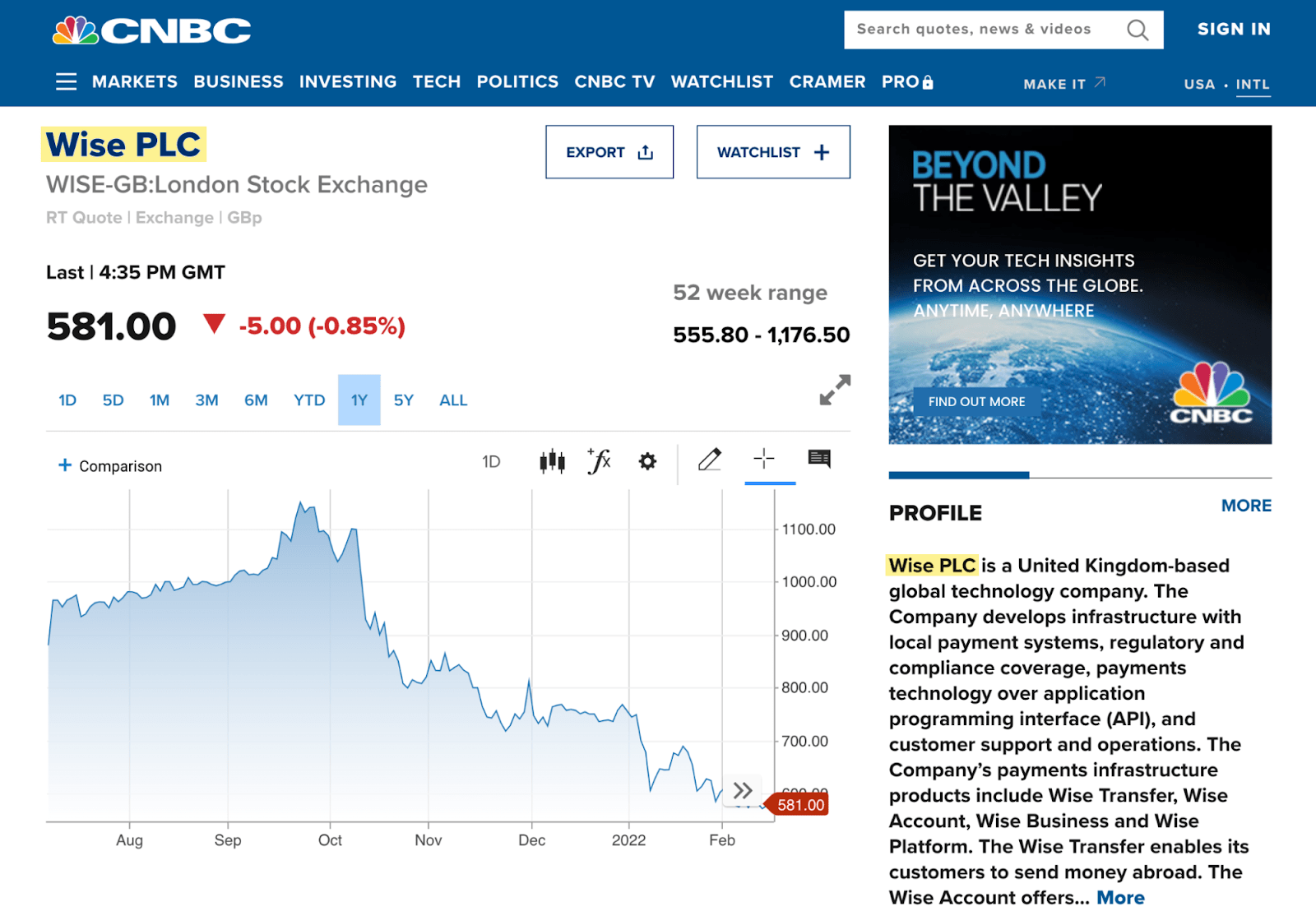
On top of that, you suddenly have many search queries related to the stock. The stock queries can become even more popular than navigational brand searches, such as the case of the Coupang stock in the U.S.:
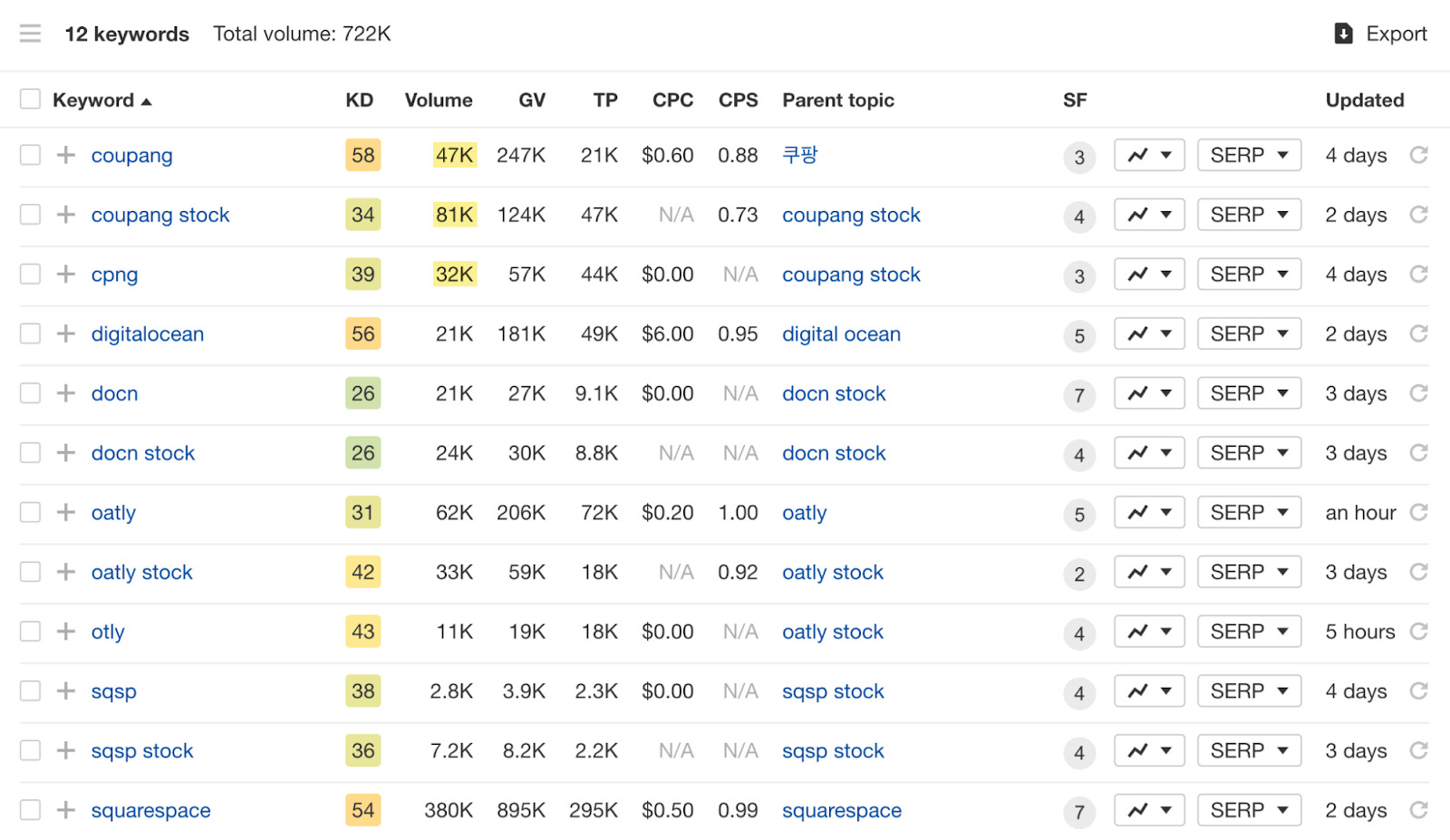
Comparison between search volumes of navigational brand searches and keywords related to the company’s stock from Ahrefs’ Keywords Explorer. The list contains only unambiguous keywords, i.e., there’s no irrelevant search intent reflected on the SERP.
All of this contributes to sending mixed signals about the entity to Google, which suddenly has the challenge of joining all the dots in its Knowledge Graph.
If you ever find yourself in this situation as an SEO, here are a few tips to leverage this opportunity and boost your KG confidence scores in the long run:
- Update information and descriptions on your website and company profiles so that they’re unified
- Use your PR team to convey unified information to the media
- Refer to the newly created company profiles related to your stock (Bloomberg, Yahoo Finance, etc.) in your “sameAs” schema property from your entity home (usually the About page)
- Be patient, as KG data isn’t usually updated that fast
You’ve already seen some examples of the high search volumes of stock-related search queries in the previous point. But going public increases the search volume of just the company name alone. It’s an extra interest on top of the standard navigational searches.
Now, it’s fair to say that this additional traffic won’t convert well. The visitors aren’t there to learn more about your products because they’re solving a problem. Rather, they’re there to do investment research.
However, as a hobby investor myself, I can tell that I’d likely turn into a customer if the problem the company is solving becomes relevant to me.
For the companies I examined, all showed search demand spikes around the dates they went public. Of course, I only considered unambiguous names like Coupang, Coinbase, or NerdWallet because we can’t segment the data for names with mixed search intent SERPs, such as About You or Wise.
Here’s an example of the clear spike in Oatly’s search volume around its IPO date on May 20, 2021, from Google Trends:
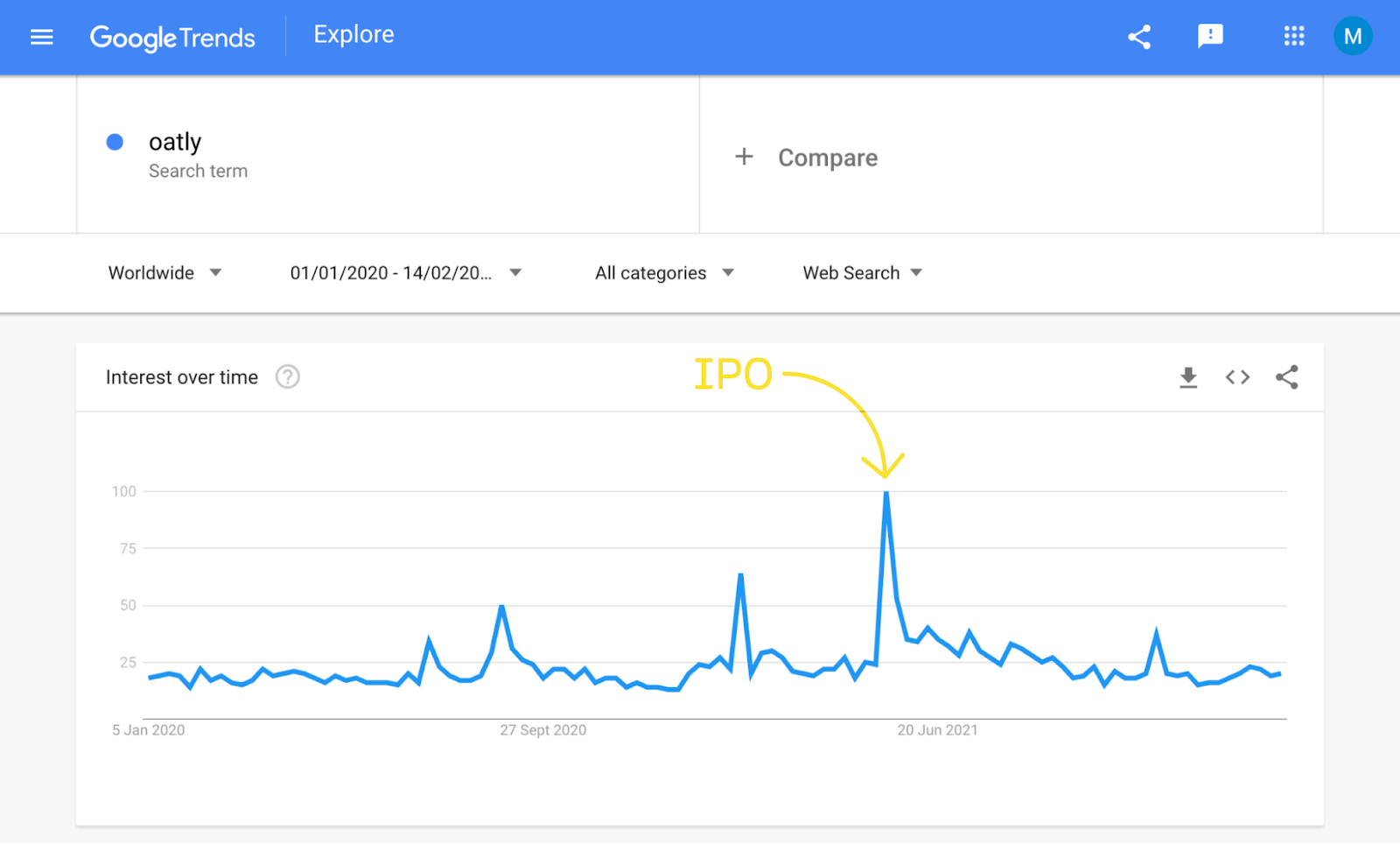
And when we take a look at Ahrefs’ Keywords Explorer, we see a clear upward trend in branded searches even after the huge spike:
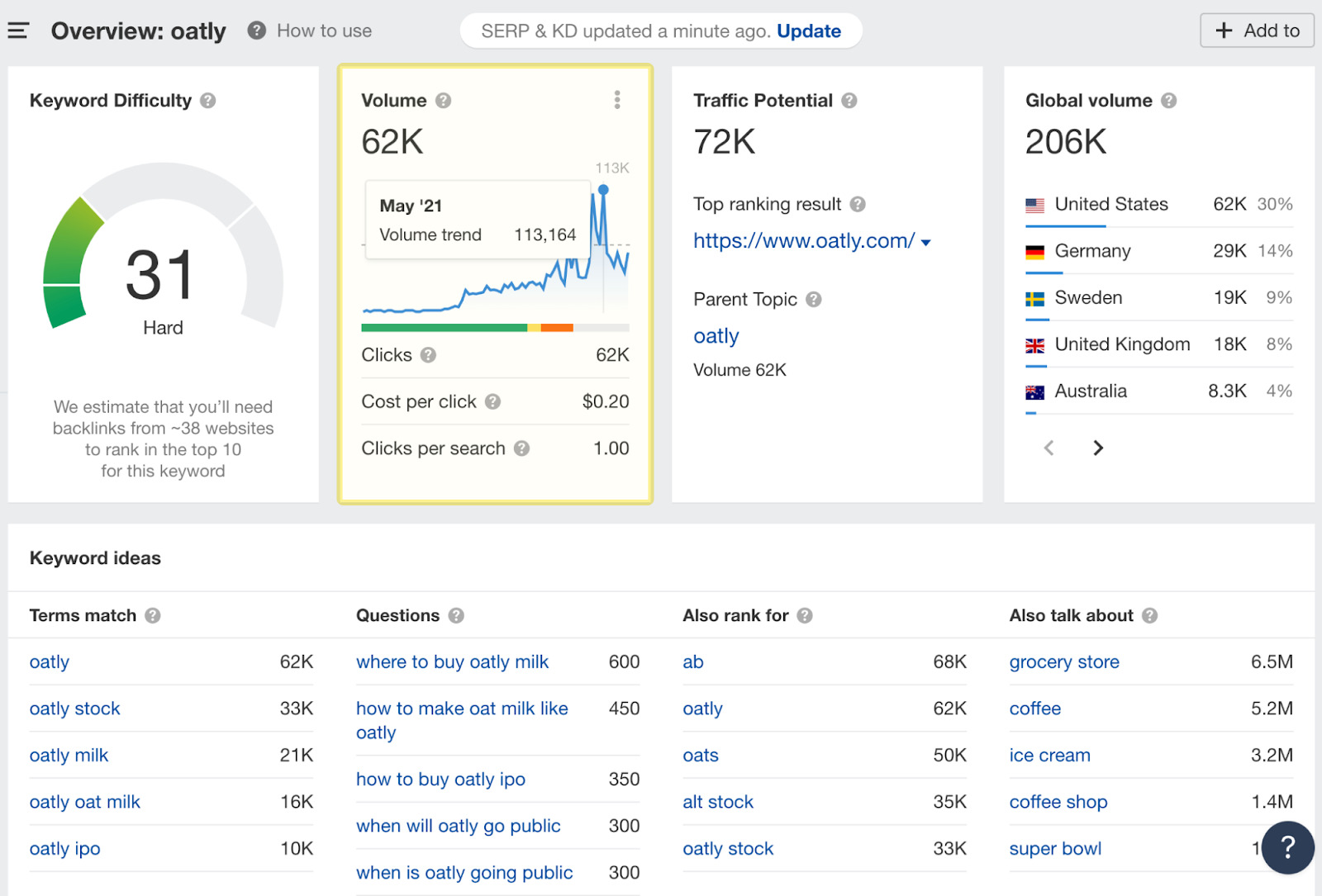
In the case of Coupang that IPOed on March 11, 2021, I noticed a significant growth in branded searches over a long period of time:
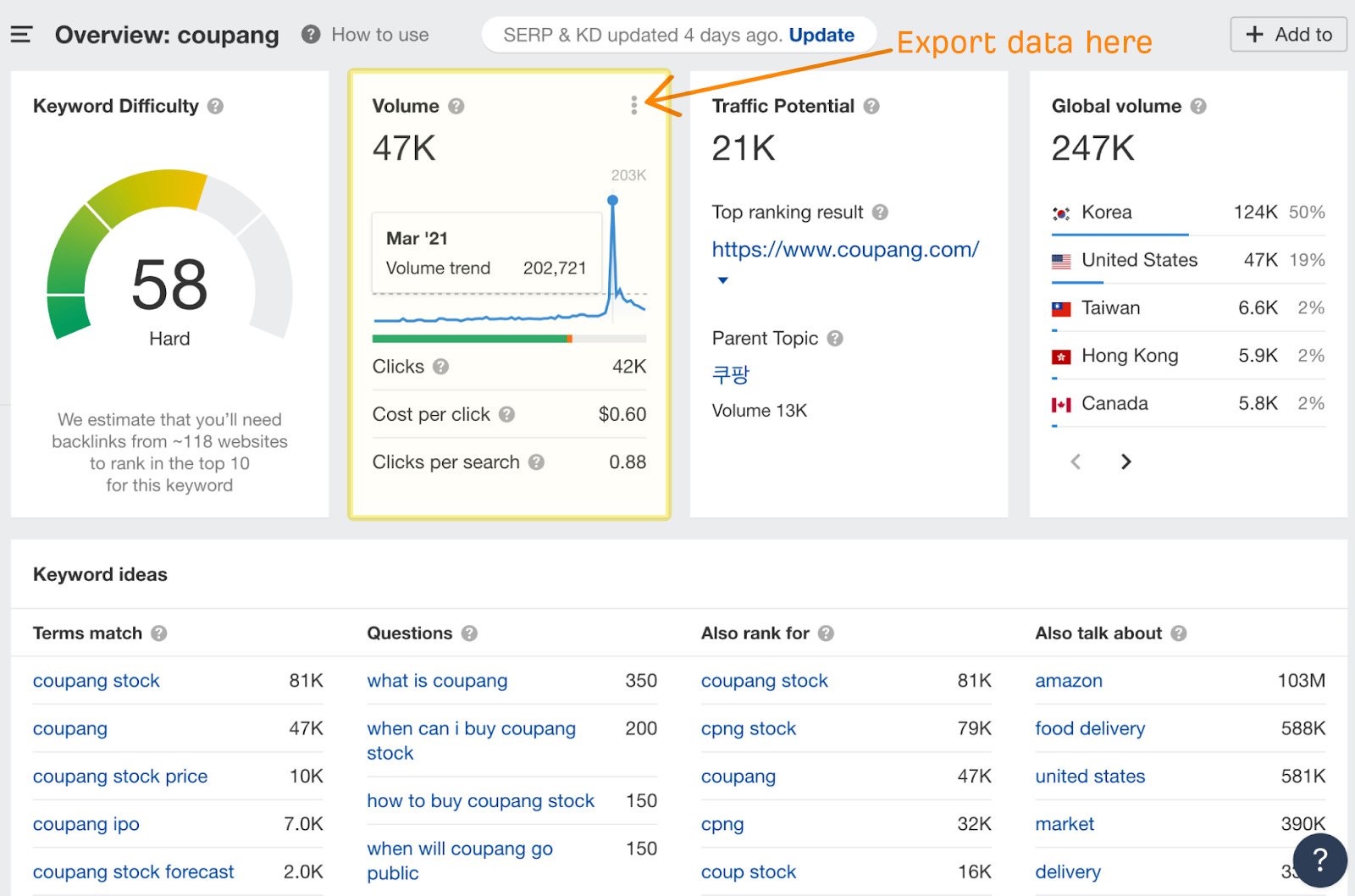
You can see the trend on the small chart, but it’s obviously more accurate to export the monthly search volume data. So I did that and made a year-over-year comparison of its search volume in the U.S.:
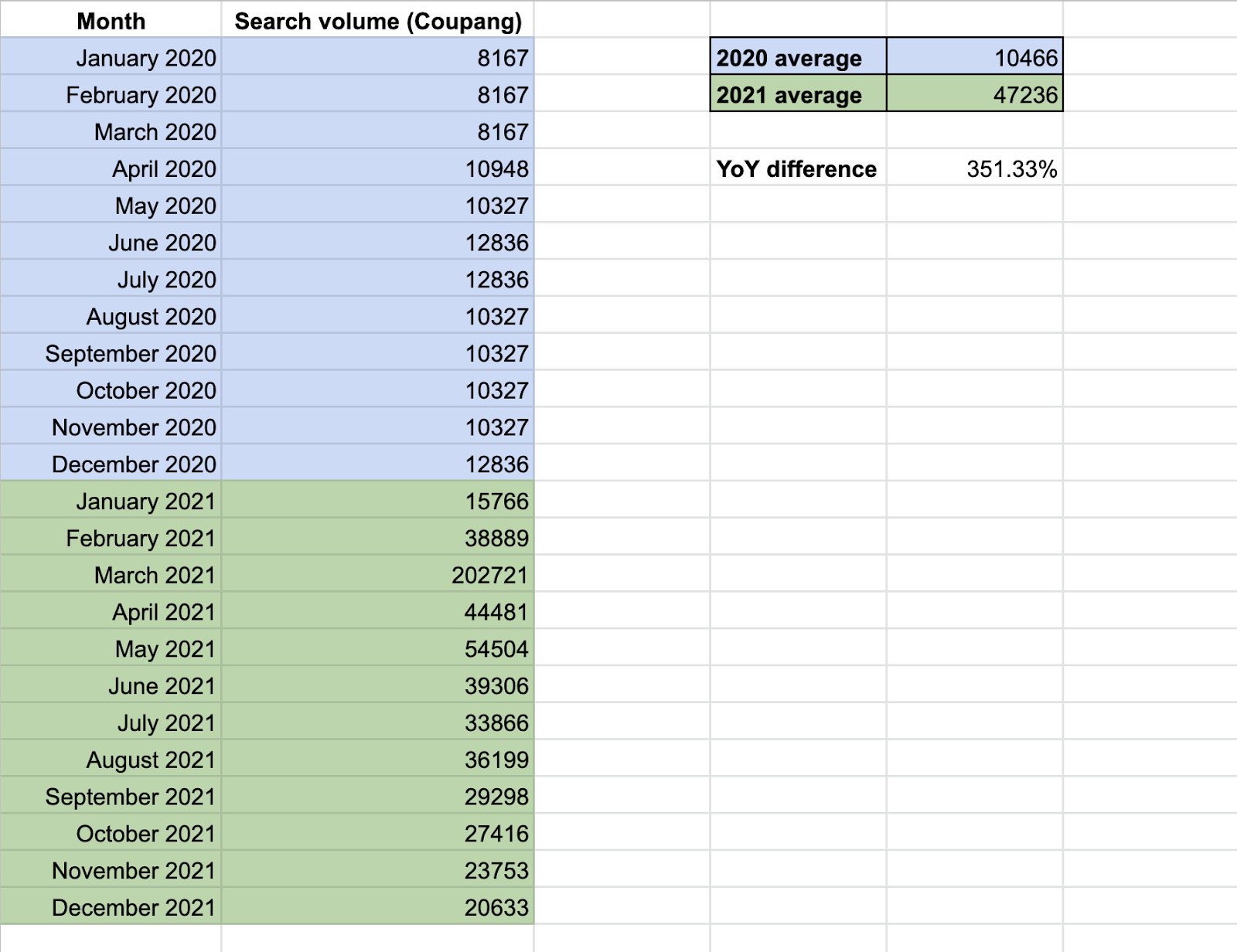
It’s important to mention that this significant growth of more than 350% is largely caused by Coupang doing the IPO in the U.S. despite being a Korean company that’s predominantly serving the local market.
There weren’t many reasons to look up the brand in the U.S. before the IPO, but it illustrates the influence that “going public” has on brand searches.
OK, that’s nice, but how does any of this provide actual SEO benefits? Three reasons.
1. Influence on search suggestions, PAA boxes, and related searches
What people search for (regarding your brand) influences the suggestions Google shows when someone types in the brand:
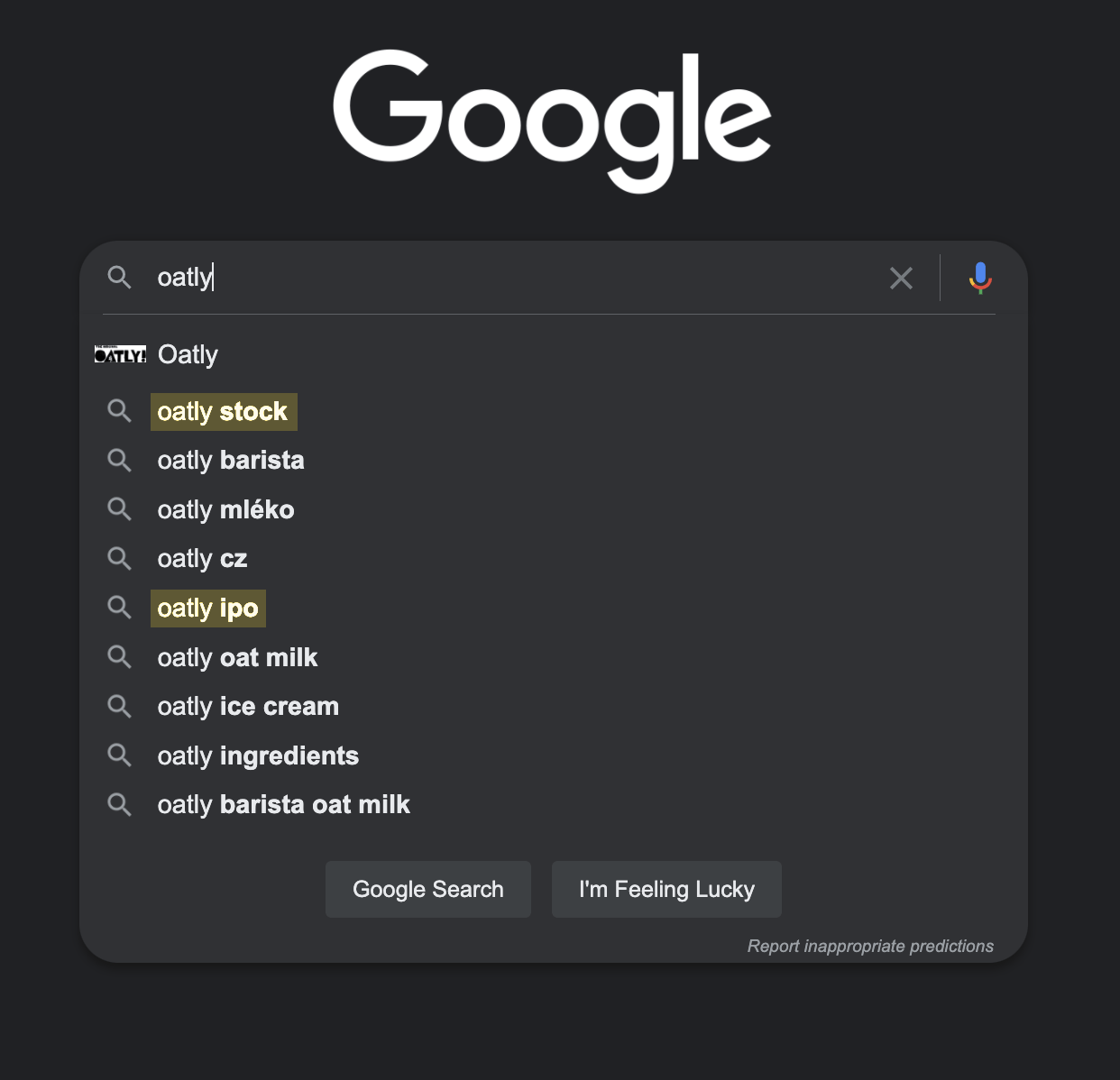
Now, when you perform the search, it also influences what appears in People Also Ask (PAA) boxes:
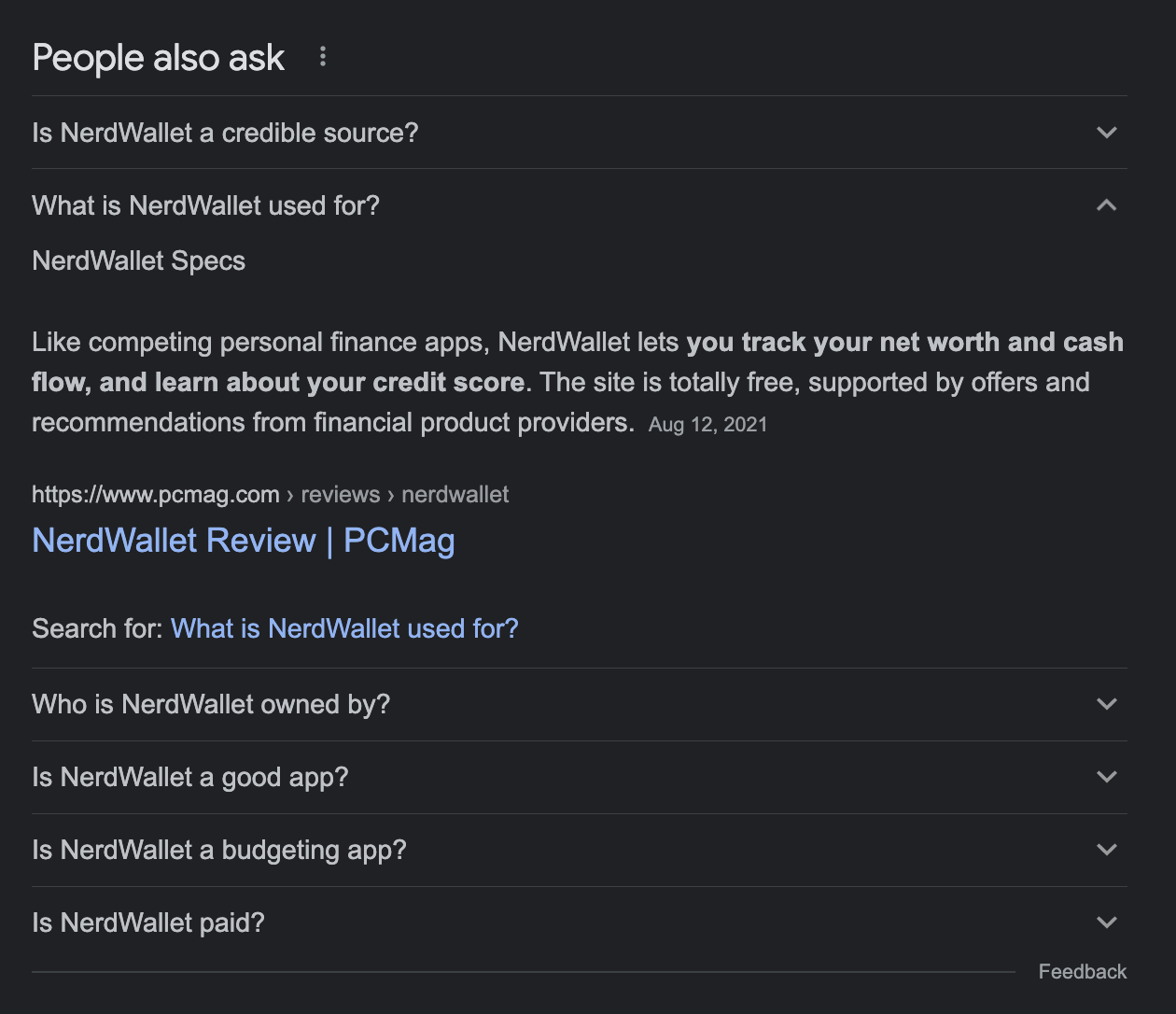
And in related searches at the bottom:
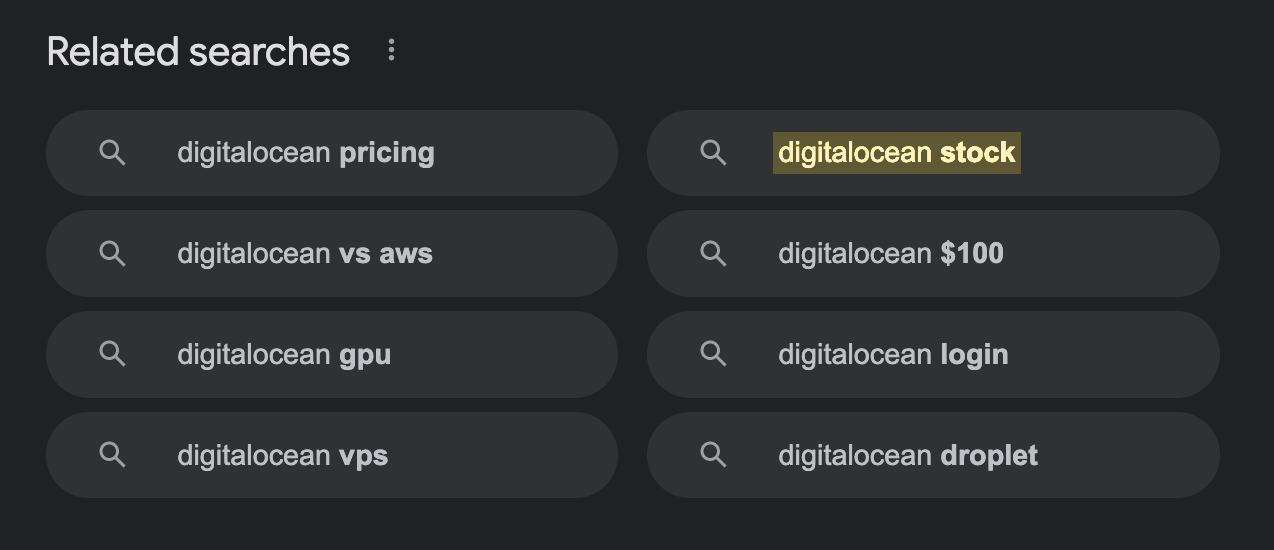
It’s worth mentioning that all of these examples were taken from an anonymous Chrome tab to minimize Google’s personalization.
Sure, showing stock-related queries and suggestions doesn’t help much in converting people in your marketing funnel, but it can push away some unwanted queries featuring your competitors or negative sentiments.
2. Controlling more SERP real estate
Related to the previous point, you also get to own (or at least partially control) more pages on the SERPs for branded searches. Here are where you can expand in brand SERPs after going public:
- Larger Knowledge Panel with more information
- Investor relation pages
- Stock-related company profiles and overviews
- Top Stories with stock-related news
Going public simply moves away potentially not-that-great search results like reviews, alternatives, or affiliate pages. It can also increase the CPC of competitors bidding on your branded terms as your brand becomes more popular and their search ads more irrelevant.
3. Potentially a ranking signal
I’m getting into speculative territory now. If I were Google, I’d consider showing a brand that gains popularity more prominently in the search results. In other words, I think that steadily increasing demand for branded searches may be one of the hundreds of ranking signals Google uses.
Even if this speculation turns out to be false, there’s still a smaller benefit: influence on the personalization of search results. I already mentioned low, if any, conversion rates from the stock-related queries, but that still counts.
For example, if I look up NerdWallet multiple times for investment research, then Google may show its results more prominently any time I look up finance-related queries. That’s because it covers tons of content about finances.
Final thoughts
There are certainly other benefits besides the four mentioned. But I feel they don’t deserve to be in the spotlight. For example, we can’t prove our thesis that the boosted brand awareness and reputation from going public may result in more earned media and higher success rates in outreach campaigns.
It’s not all about reaping the benefits, though. There are SEO tasks that need to be taken care of when going public.
Everyone should expect high traffic to IR pages the day the company enters the stock market.
The problem is IR pages should go live only when you’ve been given the green light during the IPO event. That’s usually when the search demand has already been built up. And as an SEO, you need to get those pages indexed as soon as possible. You can learn about the details of experiencing an IPO as an SEO here.
Got any questions? Do you have any firsthand experiences and insights you want to share? Ping me on Twitter.
